

Bronny James had just played in the McDonald’s All-American game. He was a five-star recruit going into college, widely considered the penultimate step before making it to the NBA. As a father, LeBron James couldn’t contain his excitement. In a revealing ESPN interview, he uttered his wish. “I need to be on the floor with my boy, I got to be on the floor with Bronny,”. He even went as far as saying his elder son is better than some NBA players. It was before Bronny had even selected his college.
Watch What’s Trending Now!
As is the case with anything the NBA’s leading scorer says, the views were divided. Some understood the fatherly sentiments of James. Others blamed him for pressurizing Bronny before he had even played college basketball. From that moment, the 19-year-old was viewed from a very particular lens, one matching the standard of an NBA player. It didn’t take long for James to realize it himself. After being swept by the Nuggets last season, he said “Just because that’s my aspiration or my goal, doesn’t mean it’s his. And I’m absolutely OK with that,”.
Nothing called for such a repairing stance. It seemed like James just had an epiphany and he changed his tone. However, is that the concrete truth? EssentiallySports decided to understand it from the eyes of an expert. Our NBA correspondent, Vishal Kolar, sat down for an exclusive conversation with Leonard Armato, a veteran in the industry and a savvy brand builder who has worked with the biggest of athletes such as Shaq and Oscar De La Hoya. He laid down the blueprint for effective athlete management and painted an image of how James’ team might have played a part in his disengagement from the dream of sharing the court with his elder son.
ADVERTISEMENT
Vishal: “How much in terms of just in general right your scope on social media and how that has clearly changed the business, especially when it comes to agents managers? Like you said, a lot of this stuff you might find out now when an athlete posts something versus you in a large part of the narrative you were in control before. Is that as an agent or a manager? Is that something that makes you more nervous now or you’re like, no, it creates a lot more good than bad?”
Armato: “Well, I think you know the most important thing you can do if you managing someone, representing someone agreeing on a plan agreeing on positioning, and agreeing on a communication strategy, and hopefully everything that they do will be consistent with that. If it isn’t consistent with that, of course, you can point it out and see if there’s any way to you know walk things back or do things differently which athletes do oftentimes,”.
The sports marketing mogul specifically mentioned LeBron James as the athlete who frequently relies on his management team to monitor public reactions and create a contingency in case things go south.
ADVERTISEMENT
Armato: “You’ve seen LeBron James do that really effectively at times he’ll say something and he’ll be like oh my gosh how could you say that then he kind of walks it back a little bit because his advisor tells him hey maybe you shouldn’t have gone that far. But I think that’s what your duty as a manager, an agent, a representative is to try to have a communication strategy, a brand positioning for your athlete and then if they go off you know the plan then you just sort of talk to them about it and see if you can pull it back. And you know I think that the more you know how closely you communicate along those lines, the better,”.
ADVERTISEMENT
ADVERTISEMENT
LeBron James’ changed tone hasn’t helped Bronny
LeBron James might have converted from his initial dialogue, but it hasn’t changed the perception circulating his elder son. Bronny James had a mediocre freshman season, having suffered a cardiac arrest during a training session. Despite the circumstances, no sympathy was reflected.
Bronny is seen from a rigid spectrum. From the time King James claimed the 19-year-old is superior to NBA players, his son was marked with a target. The ramifications of his statement unfortunately seem irreversible. The expectation of following his father’s greatness will most probably never stop chasing the basketball prodigy.
Top Stories
A’ja Wilson, Bam Adebayo Issue Strong Statement Against Rachel Nichols’ Question About Couple’s Privacy
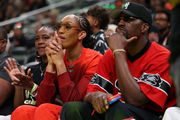
Caitlin Clark Surpasses LeBron James, Stephen Curry With 136,000 PSA Announcement
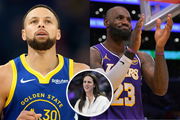
Who Is Steven Adams’ Girlfriend Kayla? Everything to Know About Rockets’ 6’11 Star’s Romance Life
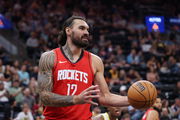
NBA World Turns On Victor Wembanyama After Subtle Dig at Shai Gilgeous-Alexander, OKC
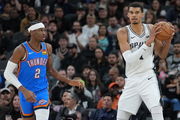
Respect Pours In for Shaquille O’Neal, Charles Barkley After $200,000 Announcement
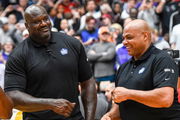
Bronny James simply dreams of making it to the NBA, a conventional dream of any basketball athlete. The pressure of being a superstar that will radiate the way his father did might be a product of LeBron James’ various comments. He did successfully garner attention around his kid. But how will a mere 19-year-old react to the inevitable adversity that is to follow?
ADVERTISEMENT
ADVERTISEMENT
ADVERTISEMENT
ADVERTISEMENT

